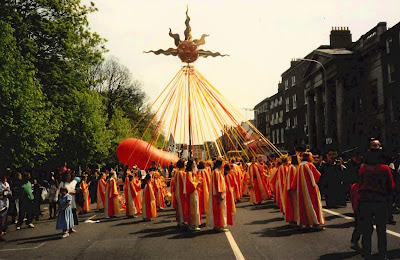In 1979, Conservative MP John Corrie introduced a private member's bill aiming to restrict abortion rights. In the climate of New Right ascendancy marked in Britain by the election of Margaret Thatcher in that year there were real fears that this would become law and a campaign was launched against the Corrie Bill. The biggest event was a massive demonstration in London in October 1979 called by the Trades Union Congress and the National Abortion Campaign. In the event Corrie did not succeed in getting his bill through parliament and the 1967 Abortion Act remained intact.
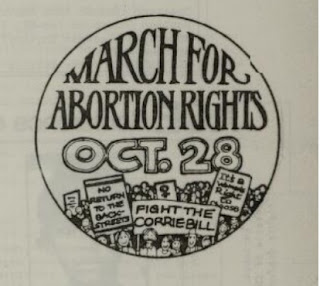
Here's extracts from a couple of reports of the demo highlighting the role of (post) punk bands.
Lucy Toothpaste:
Get up, eat my porridge, put on my feminist radical chic (or do I mean my radical feminist chic?), anyway, put on my loud yellow coat, fluorescent socks, sensible shoes etc. etc., select a thoughtful cluster of badges for the occasion and set off. Climb on the bus, discover that all the other passengers are wearing those hideous pink 'March for Abortion Rights October 28' badges too. Meet more of the same at Finsbury Park tube.
It looks like everybody in London is going on this march; it makes you feel you actually belong to a community for once. At Marble Arch they've got about twelve extra ticket collectors to cope with the throng. It's striking that despite the defensive nature of the campaign – instead of being any nearer to extending access to abortion, here we go again, trying to hold on by the skin of our teeth to the meagre provisions of the '67 Act – despite this, the atmosphere is so festive.
It's cold but the sun is streaming down, and I'm not the only one in party clothes. Demonstrations have never been the same since the anti-nazi carnivals. Old and young, gay and straight, and trade unionists and all their friends and relations have poured in on coaches from all over the country
Punks hover round the Rock Against Racism truck which is jerking along to the rhythms of the Gang of Four, Mekons and Delta Five (yelping songs like 'Can I interfere in your crisis? No mind your own business!'). Me and my friends finally leave the Park (after about a two hour wait, and we're nowhere near the end of the march) with the feminist all-stars on the Rock Against Sexism lorry. We dance all the way from Park Lane to Trafalgar Square, and all join in singing (except that my voice has mysteriously done a bunk and I can only mime) Lottie & Ada's ditty to the tune of 'I've got a brand new pair of roller skates':
'I've got a brand new Private Member's Bill
Guess what it's going to be
I'm going to make sure lots of women
Remember John Corrie'
By the time we reach Trafalgar Square it's too full to hold any more people, and as it's turned very grey and cold we're glad of an excuse to slope off to the cafe for tea...
Over 50,000 people marched against the Corrie Bill, differing as our political affiliations may be, but all agreeing that it threatens us with substantial risk of serious injury. The bill restricts the time limit and approved grounds for abortion, and decimates the abortion charities, with the aim of reducing legal abortion by two-thirds.
Some see it mainly as a class issue, because even when abortions are illegal, richer women have usually managed to get them done without too much trouble, and it's working-class women who are forced into the danger and humiliation of the backstreets.
Some see it as fundamentally a women's issue, part of the international fight for control over our fertility: If we get pregnant, it's women who have to bear the consequences, so it must be our decision whether to have an abortion or not, rather than that of doctors, priests or MPs. We are demanding not only free access to abortion, but also really safe and effective contraception, and an end to forced sterilization and experimentation on black and brown people in the name of population control.
Some see it above all as part of the fight to determine our sexuality. Thousands of lesbians and gay men were on the march, not just in solidarity, but to point out that an attack on abortion rights is an attack on everybody's right to enjoy sex for its own sake, without guilt and without fear, whether or not we intend to have children.
By the time you read this, some version of Corrie's bill will probably have passed into law . But we won't stop fighting until we get Complete Control'.
Kate Webb:
'In the new climate of this past year, one of rock's most concrete political achievements for women has been the contribution made to the Anti-Corrie Bill Campaign. Temporary Hoarding described the demo on 28 October last year as 'The most vociferous, musical and non-boring demo in the history of the world'
Hundreds of mad joggers dancing along side the Rock Against Sexism truck while hurtled down Park Lane, carrying assorted members of Delta 5, Mekons and Gang of Four blasting out assorted variations of their songs, all under the wonderful Day-Glo banner which proclaimed WOMEN CHOOSE DON'T ARGUE!
It was all too much for the inhabitants of the Playboy Club. They called in the cops to come and line up outside for fear of being attacked by this wild bunch of pogoing punks, expectant mums and mad musicians. And they might well have been, if we hadn't been too busy enjoying ourselves. It was an occasion when one of those boring old 'Against Them' demos turned into a celebration of what we are. Our Bodies and Our Culture and Our Music'.
[from The Book of the Year', edited by David Widgery (Ink Links, 1980)

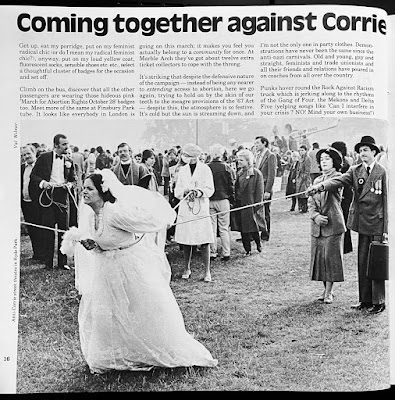
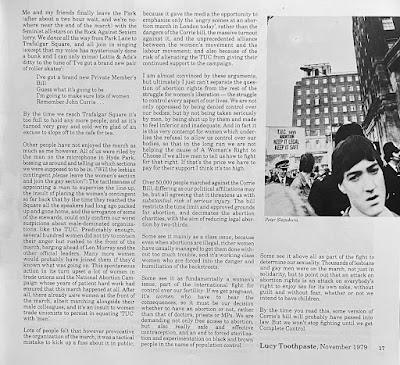






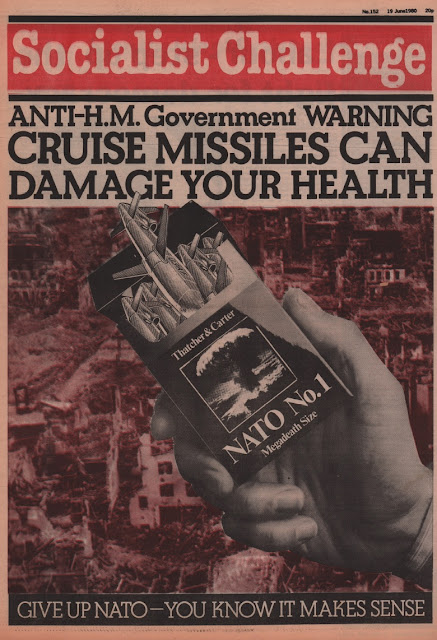



















.jpg)





